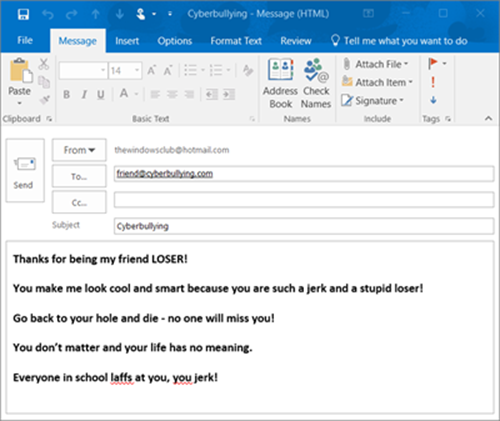The Internet provides anonymity that emboldens cyberbullies. Let’s check out what is cyberbullying, how it affects people, how to prevent it, and where to report cyberbullying.
What is Cyberbullying
Bullying is mostly associated with school kids. The word bullying includes one or more of the below: The above list does not cover all the possible forms of bullying. Neither does the above constitute a crime unless there is severe physical harm done or any law is breached. As such, law enforcement authorities leave it to parents and schools to check bullying. The same is the case with cyberbullying. The only way it is different from the above is that it involves Internet, computers, and smartphones. Read: Online Safety Tips for Kids, Students and Teens.
Some examples of cyberbullying
Bullying makes the bully confident. It gives him a dose of confidence and makes him or her feel powerful, and in control. In some cases, it may be simply a case of revenge against another and believe that they are safe and won’t get caught. That is why such people engage in bullying. Generally, the bullied is targeted over and over until he or she starts fearing everything around. Again, the law enforcement authorities won’t do much in the case of cyberbullying as it is not a crime as long as there is no severe physical violence or an attempt to dishonor the child. At most, the schools and parents will bring in counselors to help both the bully and the bullied.
Effects of Cyberbullying
While effects of ground bullying may result in avoiding a person or school, the effects of cyberbullying reach far. As said earlier, the person being bullied may not feel safe anywhere. The person would be afraid even in his or her house, though the parents may be at home. The visible symptoms of cyberbullying are: The effects of cyberbullying can get more serious: unexplained anxiety, chronic depression (lack of interest in anything and the child keeps to his or her room all the time), panic and fear, etc. If parents notice any such symptoms, they must take the child immediately to a counselor.
How to prevent cyberbullying
The easiest path that could be taken is to stay away from the bully and ignore the person. But since cyberbullying takes place via the medium of the Internet and the victims are children or young adults, it would be a difficult path to follow. Parents and schools need to step in to prevent cyberbullying. Schools and colleges should have an active anti-bullying policy. If such cases are found, schools should invoke counseling via therapists. You need to be aware that both the victim and the bully need counseling. Coming to the prevention of cyberbullying, the US federal government recommends keeping an eye on what your child is doing. It says you have to: There are many programs to this end. There is Microsoft’s own Family Safety Program. You can use one of the many free parental controls developed for recent versions of Windows. Also, there are DNS providers that provide good control of your child’s browsing. You may want to check out the features provided by OpenDNS. I would like to add that you also have to educate your children about bullies, how the bullied suffer if they start fearing the bullies, and to inform you as soon as anything happens online or offline.
How to report Cyberbullying
Law enforcement authorities will step in the following cases: You might report other forms of cyberbullying as well, but there is not much they will do. They might warn the person bullying, if possible. Here the places to report cyberbullying in other cases: Here are some organizations where you can seek help: stompoutbullying.org | iheartmob.org | crisistextline.org | onlinesosnetwork.org | cybersmile.org | cybercivilrights.org. Do check out this Interactive Anti-Bullying Tool for Parents. You may also want to contact the parents of the bully and tell them about the behavior of their children (bullies). Please consult with local law enforcement authorities if you see matters getting out of hand.

